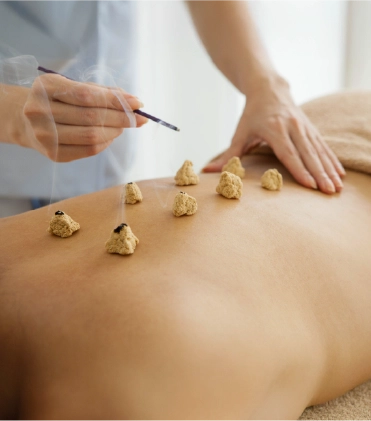Traditional Chinese Medicine (TCM) is a proper healthcare system that is being used to prevent and manage the symptoms of an illness. It is based on healing that involves various therapies such as acupuncture, herbal medicine, cupping, massage, and dietary therapy. In traditional Chinese medicine, a treatment is planned to balance Yin and Yang, which are known as opposing forces. When these two forces are in balance, the body remains healthy, but whenever this balance is disturbed or one energy exceeds the other, the body develops illness.
TCM has been used for over 2,500 years and is deeply rooted in Chinese philosophy. It is based on the principles of Yin and Yang and the Five Elements of life i.e. wood, fire, earth, metal, and water. It is believed that there is a special kind of force or energy present in everyone known as Qi. In traditional Chinese Medicine, health is achieved when this flow of Qi (energy) is balanced and flowing freely through meridians known as energy channels in the human body.
Physical Benefits:
Mental/Emotional Benefits:
Long-Term Wellness:
Ideal Audience
Traditional Chinese Medicine is suitable for individuals who wish for a natural and holistic approach to health, especially those who prefer preventative care for chronic conditions that haven’t shown any response to conventional treatments.
Specific Conditions
Traditional Chinese medicine is used for chronic pain such as headache, muscle, or joint pain for over six months. It has also been used to treat digestive disorders like bloating, and indigestion. Respiratory issues like asthma and sinusitis can also be treated with TCM. It is very effective in improving the symptoms of stress, anxiety, depression, insomnia, and other sleep disorders. Fertility health can also be improved by following the holistic approach of TCM.
Initial Consultation
The practitioner evaluates the physical and emotional state, lifestyle, and medical history of the patient. This helps the practitioner to identify imbalances in Qi and determine the underlying condition that is disturbing the natural energy of the body.
Personalized Treatment Plan
Based on the examination, the TCM practitioner plans a treatment which may include acupuncture, herbal remedies, dietary advice, and other modalities. The treatment is individualized according to the specific needs and goals of each patient.
Acupuncture
IN THE TECHNIQUE OF ACUPUNCTURE, fine and sterile needles are inserted at specific points along the channels of body energy to balance the flow of Qi. Acupuncture stimulates the healing mechanisms, reduces swelling, and promotes the release of endorphins, which are also termed natural painkillers. Sessions of acupuncture typically last 20-40 minutes and may involve the gentle manipulation of needles to enhance therapeutic effects.
Herbal Medicine
Herbal medicines made of plants, roots, and minerals, are prescribed to nourish and support the healing process. Herbs can also be taken as teas, capsules, and powders.
Cupping
In cupping therapy, glass or silicone cups are placed on the skin to create a vacuum that promotes blood circulation and relieves muscle tension. Cupping helps to release toxins and improves the flow of Qi which ultimately alleviates pain and inflammation.
Tui Na (Massage Therapy)
A therapeutic form of Chinese massage is used to treat musculoskeletal issues, promote circulation, and balance energy flow. The massage may include pushing, kneading, and stretching techniques to target tension and blockages in the body.
Dietary and Lifestyle Adjustments
The practitioner provides dietary recommendations based on the Five Elements and Yin-Yang principles to support the treatment and promote balance. Lifestyle changes, including mindfulness practices, yoga, or Tai Chi, may be suggested to maintain emotional and physical health.
What to Expect
During TCM treatments like acupuncture or cupping, patients can expect a gentle, calming experience. Acupuncture may cause a slight tingling sensation or warmth where the needles are inserted, but it is generally painless. Cupping may leave temporary red marks but does not cause pain. Herbal medicines might have a strong taste, but they are an important part of the healing process. Patients often feel relaxed and fresh during and after each treatment session.
Immediate Effects
Many patients report feeling a sense of relaxation and relief from symptoms immediately after treatment. There may be a reduction in pain and tension, as well as improved mood and energy levels.
Long-Term Effects
Traditional Chinese Medicine treats the root cause of illness which leads to lasting relief from chronic conditions. Long-term effects include improved vitality, improved immune function, and overall wellness. The treatment supports balance within the body, which can help prevent future illnesses and improve quality of life.
Before the Treatment
Patients should wear loose, comfortable clothing for easy access to acupuncture points. They should also avoid heavy meals or alcohol before the session. Maintaining a relaxed and open mindset to optimize the therapeutic process is recommended.
Aftercare
Practitioners advise to stay hydrated and rest after the treatment. Avoiding forceful activity or extreme temperatures for a few hours after the session is recommended. It is important to follow any dietary or herbal recommendations from the practitioner. Returning for follow-up sessions is also very important to sustain the benefits.
Traditional Chinese Medicine is popular in countries with strong ties to Eastern medicine, such as China, Taiwan, and Japan. In recent years, TCM has become increasingly integrated into complementary and alternative medicine practices in Western countries like the U.S. and U.K. Wellencia is one of the best platforms that connects people from all over the world with certified traditional Chinese medicine practitioners.









